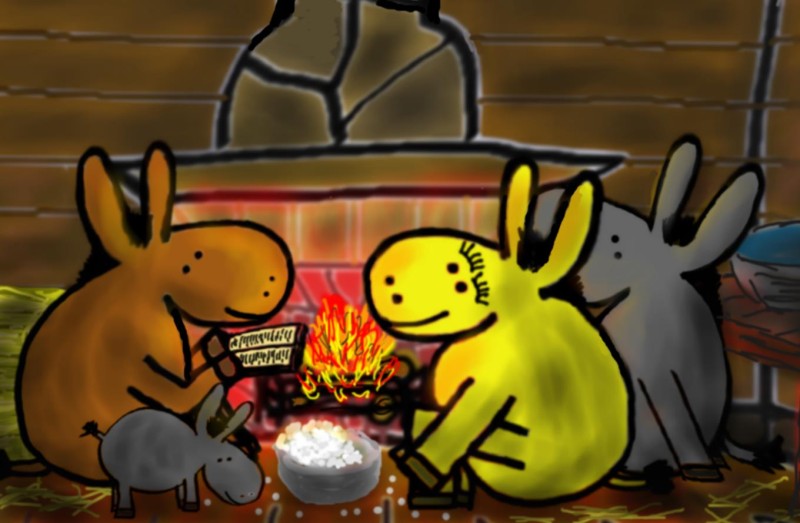What a great day, said Blurtso. Yes, said Pablo, as good as it gets. What shall we do now? said Bonny. I don’t know, said Pablo. How about a story? said Bonny. Yes, said Blurtso, a story! Very well, said Pablo, I’ve been reading a novel titled, The Adventures of Captain Harvey, perhaps I could read a chapter out loud? What’s it about? said Bonny. It’s about a character, said Pablo, called Captain Harvey, who has the ability to take on the personality of whomever or whatever he encounters. Like a chameleon? said Blurtso. Yes, said Pablo, just like a chameleon. Now, in the chapter I will read Captain Harvey has arrived at a village in the mountains north of Rome, and he has been taken in by a middle-aged couple, Elio and Agnese, and their adopted servant girl, Fiammetta. Go on! said Bonny. Yes, said Blurtso, go on! Alright, said Pablo, it begins like this…
“While the days were dedicated to caring for the animals, bringing wood and water, and preparing meals, the nights were passed in front of the fire, as the four residents and whatever neighbors happened to stop in would settle down to talk. Early on, the conversation would focus on what work had been done that day, and what remained for tomorrow, and then it would turn to the latest report of rumors. At some point, Elio would excuse himself to join his friends at the bar. On this night, Agnese scolded him, ”
“Good company?” said Elio. “Fiammetta says nothing, and you and Harvey go on like old women!”
“Well!” said Agnese. “If you ever said something… Why don’t you tell a story? You used to tell such fine ones. I’m sure Harvey would enjoy one.”
As Elio paused to consider which story he might tell, a stream of protagonists, antagonists, climaxes and anticlimaxes rushed through his head, but before he could choose one, Harvey began for him:
“Filomena was fifteen years old,” said the captain, “when her grandmother told her, ‘If you want your child to be a boy, you must sleep on your right side and have your midwife use water in which a murderer has washed his hands…’”
Elio was relieved, for he was too tired to make something up, and he liked having stories told him, because then it was real and not just remembering, so he put a log on the fire and sat back down in his place.
The story Harvey told, though taken directly from Elio’s memory, was not as Elio remembered it, for just as the log began to crackle and whine in the fire, it altered the captain’s tale until the listeners could hear the cracking of a whip, or the cries of a forsaken child, or the moans of an impassioned lover. What our hero told, in fact, was the history of the life of the log, of its stored energies released into the arms of the air. The listeners were enthralled. Even the romantic encounters, which surprised them with their attention to detail, were done with such delicacy that Agnese could not be offended, and Fiammetta moved into the light.
The group would listen, apprehensively at first, wondering if he would improvise or tell a stock tale from one of their memories. If it was early, he would spin the yarn leisurely, amplifying here and interpolating there, always going on in a steady, gentle voice, except when he impersonated a man or woman in the throes of passion or a demon in a fit of rage. Then he would pause, anticipating with his silence the pleasure certain to come, and as the fire began to wane the pauses would become shorter and less frequent, and he would bring the story to an end, reuniting lost lovers or reconciling the hero to his fate, and leaving the group with a feeling at once of fulfillment and loss.
Each story was different, taking its theme from the nature of the wood. There were stories of those who reached the happy end they had sought, or those who obtained what they desired or regained what they had lost, or those for whom love had an unhappy ending, or those who won happiness after grief and misfortune. And there were the stock tales of the tricks played by men upon women, or women upon men, or men upon men and women upon women, and each was born of the same fiery source. It was not long before Harvey began to look at everyone he met in terms of the fire. What kind of flame was Elio? Was his wood slow and deep, or superficial and smoldering at the edges? What was Agnese? What was Fiammetta? What was he…?
